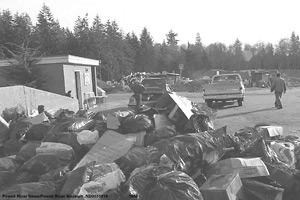Powell River Regional District rural directors have put the brakes on a recommendation to fund closure plans for former landfill sites from the waste management reserve.
In March, elected officials directed regional district and City of Powell River senior management to prepare revisions to the draft solid waste management plan. Staff met in April and agreed on wording, which was subsequently brought forward to the May 12 regional district committee-of-the-whole meeting.
The revisions address former disposal sites within city boundaries. The new wording states that closure plan costs will be funded from the regional district waste management reserve, as part of its solid waste management planning responsibilities. The revision also states that upon completion of closure plans, the regional district and city will negotiate how the associated closures will be funded. It also delays the development of closure plans by one year and reorders the schedule. The revision suggests the following schedule: municipal airport site, 2012; municipal incinerator site, 2013; and Squatter’s Creek landfill, 2014.
In his report to the committee, Mac Fraser, regional district chief administrative officer, noted there is $1.2 million in the waste management reserve. Using the reserve to fund site closure plans is common, but not the sole approach throughout the province, he wrote. However, he listed two reasons why it would be appropriate for the regional district to fund the closure plans. “As there are no known disposal sites outside of the city, it is reasonable to expect that all residents in the region contributed waste to the incinerator and Squatter’s Creek sites directly or indirectly through the use of public and private sector services located in the city,” he wrote. He also noted that the city has contributed 67 per cent of the solid waste management reserve.
City council approved the revisions at a special council meeting on May 10, but rural directors rejected them.
Colin Palmer, regional district board chair and Electoral Area C director, said he thought officials should discuss the entire solid waste management plan at a joint meeting. “I’d like to think that before we got to the recommendation that is on the table right now, that everybody understands what this plan could possibly mean,” he said. “I guess my concern is, does everybody know where this is heading?”
Chris McNaughton, city director, pointed out that officials have had a number of conversations about the issue. Stan Gisborne, Electoral Area B director, said the motion directed staff to prepare revisions “that are satisfactory to all parties.” He noted that while the revisions are satisfactory to council, “they’re certainly not satisfactory to the directors.”
Gisborne agreed that rural areas contributed 33 per cent of the reserve, but, he said, only 10 per cent of household waste that went to the city site came from rural areas. Household waste is only part of the material stored at the site. Other material, such as concrete and piping, came from the city. “You talk about fair?” he said. “It’s not fair that rural areas contribute 33 per cent of the cost to clean it up.”
McNaughton replied that the discussion was about developing a closure plan, not cleaning it up.
In the end, rural directors voted down a motion to accept the proposed amendment. McNaughton and Aaron Pinch, an alternate city director, voted for the motion. Rural directors then passed a motion directing staff to arrange a meeting with city officials. McNaughton and Pinch voted in opposition to that motion.



